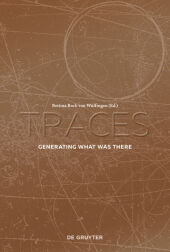 Neuerscheinungen 2017Stand: 2020-02-01 |
Schnellsuche
ISBN/Stichwort/Autor
|
Herderstraße 10
10625 Berlin
Tel.: 030 315 714 16
Fax 030 315 714 14
info@buchspektrum.de |

Bettina Bock von Wülfingen
Traces
Generating What Was There
Herausgegeben von Bock von Wülfingen, Bettina
2017. 122 S. 30 b/w and 50 col. ill. 230 mm
Verlag/Jahr: DE GRUYTER 2017
ISBN: 3-11-053478-9 (3110534789)
Neue ISBN: 978-3-11-053478-8 (9783110534788)
Preis und Lieferzeit: Bitte klicken
Traces keep time and make the past visible. As such, they continue to be a fundamental resource for scientific knowledge production in modernity. While the art of trace reading is a millennia-old practice, tracings are specifically produced in the photographic archive or in the scientific laboratory. The material traces of the forms represent the objects and causes to which they owe their existence while making them invisible at the moment of their visualization. By looking at different techniques for the production of traces and their changes over two centuries, the contributions show the continuities they have, both in the laboratories and in large colliders of particle physics. This volume, inspired by Carlo Ginzburg´s early works, formulates a theory of traces for the 21 st century.
Traces keep time and make the past visible. As such, they continue to be a fundamental resource for scientific knowledge production in modernity. While the art of trace reading is a millennia-old practice, tracings are specifically produced in the photographic archive or in the scientific laboratory. The material traces of the forms represent the objects and causes to which they owe their existence while making them invisible at the moment of their visualization. By looking at different techniques for the production of traces and their changes over two centuries, the contributions show the continuities they have, both in the laboratories and in large colliders of particle physics. This volume, inspired by Carlo Ginzburg´s early works, formulates a theory of traces for the 21st century.
Bettina Bock von Wülfingen, Humboldt University of Berlin.


